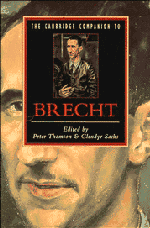Book contents
- Frontmatter
- PART 1 CONTEXT AND LIFE
- PART 2 THE PLAYS
- 3 Brecht's early plays
- 4 The Threepenny Opera
- 5 Brecht's clowns: Man is Man and after
- 6 Learning for a new society: the Lehrstück
- 7 Saint Joan of the Stockyards
- 8 The Zelda syndrome: Brecht and Elisabeth Hauptmann
- 9 The Good Person of Szechwan: discourse of a masquerade
- 10 Mother Courage and Her Children
- 11 Heavenly food denied: Life of Galileo
- 12 The Caucasian Chalk Circle: the view from Europe
- PART 3 THEORIES AND PRACTICES
- Bibliography
- Index of Works
- General Index
11 - Heavenly food denied: Life of Galileo
from PART 2 - THE PLAYS
Published online by Cambridge University Press: 28 May 2006
- Frontmatter
- PART 1 CONTEXT AND LIFE
- PART 2 THE PLAYS
- 3 Brecht's early plays
- 4 The Threepenny Opera
- 5 Brecht's clowns: Man is Man and after
- 6 Learning for a new society: the Lehrstück
- 7 Saint Joan of the Stockyards
- 8 The Zelda syndrome: Brecht and Elisabeth Hauptmann
- 9 The Good Person of Szechwan: discourse of a masquerade
- 10 Mother Courage and Her Children
- 11 Heavenly food denied: Life of Galileo
- 12 The Caucasian Chalk Circle: the view from Europe
- PART 3 THEORIES AND PRACTICES
- Bibliography
- Index of Works
- General Index
Summary
Brecht's Life of Galileo is probably his most popular single work, both on stage and in print: in German, it outsells all other works by Brecht (2.4 million copies up to 1990). Yet it is also by far the most heavily rewritten of all his plays, with at least one turnabout in the ultimate horizon and intended message; Brecht was never quite comfortable with it; and he died in the middle of directing its rehearsals, not having (as I shall argue) fully resolved the play's horizon. The harsh vocabulary in his note of 25 February 1939, three months after writing the first version, can be taken as valid for all the extant versions:
LGis technically a great step backward ... too opportunistic. One would have to rewrite the play totally if one wanted to have this 'breeze that comes from the new shores', this rosy dawn of science. All more direct, without the interiors, the 'atmosphere', the empathy. And all directed toward planetary demonstration. The composition could stay the same, the character of Galileo too.
(AJ, 1, p. 32)Though Brecht all along believed with good reason that the final selfcondemnatory speech of Galileo's could — 'with a strictly epic performance' — subsume the empathy into this great figure under the necessary estrangement (AJ, 1, p. 27), he was aware that centrally significant ambiguities remained. A sketch of the three main versions, usually called the 'Danish', 'American' and 'Berlin' versions, may be useful here.
- Type
- Chapter
- Information
- The Cambridge Companion to Brecht , pp. 139 - 152Publisher: Cambridge University PressPrint publication year: 1994
- 3
- Cited by



